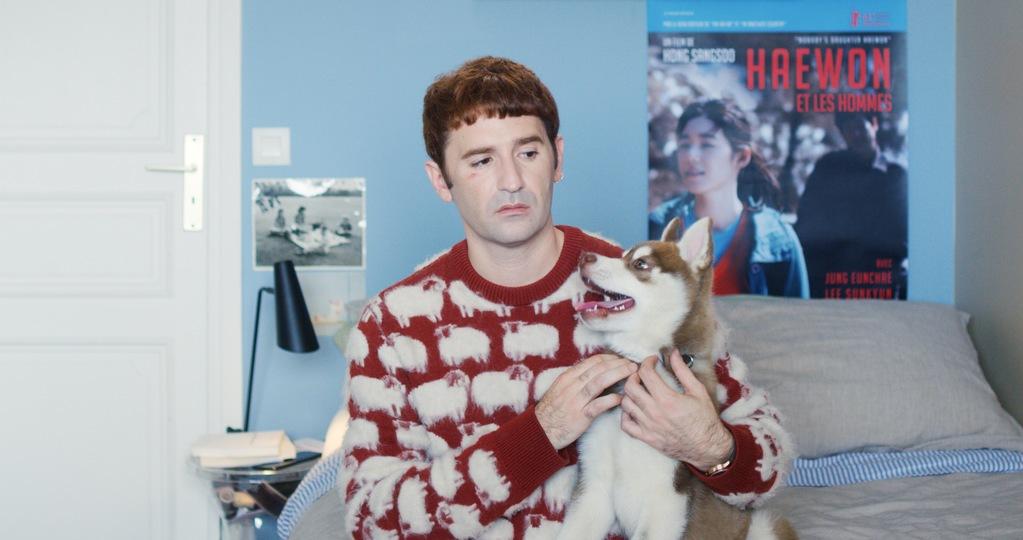The main theme of My Best Part is jealousy. Jérémie, the lead character says that it burns his blood. Did you do research?
N The most basic item of research was my own life. When I arrived in Paris as a teenager raised in the country, in the Limousin region, almost immediately I fell head over heels in love and, like all devouring passions, it involved overpowering jealousy. Also, I had soaked up the classics of the genre. Proust, obviously. Very early, perhaps too early. And Roland Barthes, who wrote, “Jealousy makes me suffer four times over: being excluded, being aggressive, being crazy, being ordinary.” I don’t like the regular stereotype of jealousy with all the theatrical clichés it involves, the lover in the closet, etc. On the other hand, I love people who reveal their anxieties. In films, it’s pretty much the same: the most intense roles are passionate characters. I think that jealousy is a powerful decipherer of the world, in the sense that it encourages the urge to overcome what you imagine. The tragedy, if I can call it that, is that the jealous person is not always wrong. They picture things in their mind, and crazily enough it turns out the picture is often right. Jealousy is like tinnitus, background noise only you notice, whose painful, grating repetition 8 9 sometimes makes you want to disappear. Disappearing from love that drives you mad is a magnificent and dangerous notion. A form of slow-burn suicide. François Truffaut filmed it perfectly in Adèle H., who is horribly burned by jealousy. I was raised by women who, within my earshot, often talked about jealousy— first and foremost my mother, who lived with the anxiety that I partially inherited. One evening, when I was nine years old, the telephone rang. Out of nowhere I said to my father, “You should pick up, it might be your mistress.” Innocently, but overflowing with intuition, I’d landed on the truth. My mother hung her head, my father just gawked. Their relationship had definitively capsized.
Is it for all these autobiographical reasons that you decided to play Jérémie yourself?
N Not only. I considered many excellent actors of my generation to play Jérémie, but nobody was right. It wasn’t an issue of resemblance or not. In fact, my hesitations concealed a slightly shameful, pretentious desire. I had to see myself. I wanted to be looked at when I shouldn’t be looked at—at once, comic, whimsical and tragic to the point of pathetic, because naturally there is a grotesque element to the drama. My performance aimed to play on disparities between these different aspects. What interests me is instilling a horde of details in my behavior, actions, vocal inflections or silences, a hemorrhage of signs that bring something to life, or at least generate a sense of reality, truth, ability to impact others—in this case the film’s audience.
In the hit TV series, Call My Agent, you play an actors’ agent. In My Best Part, Jérémie, a struggling actor, runs into a few characters from the film world. You don’t go easy on them.
N It’s all personal experience. The director who flips out, played by Laure Calamy, says everything I could ever say about good or bad advisers. She embodies the disaster that lies in wait for directors when people think for them and want things for them, supposedly knowing better than them. At least she has the courage to get on first-name terms with catastrophe. The other director, played by JeanMarc Barr is another type—the fake nice guy. He gives Jérémie a part in his upcoming film, only to kick him off the project, concluding their conversation with a phrase, whose cruelty he cannot gauge because he is so sincere: “Of the two of us, the one who suffers most is me.” Stabs pretending to be caresses. That sums up the film industry.
You co-wrote the script with Maud Ameline and Sophie Fillières, who is also a director…
N Sophie taught me a fundamental lesson: getting over the word impossible. On the shoot of My Best Part, without anybody necessarily saying so, I sensed that some things, some shots, were considered impossible. I resisted and persisted because I was convinced that it was precisely because something was rated impossible that we needed to do it. I remember one particular long take with my character. In the crew’s eyes, I could see doubt or even a rebuke, but I stuck at it because a very personal refrain was playing in my mind: I wanted to evoke and get across my fluid, shifting state of being in the world, and that requires a certain length.
That refrain could also be music?
N It’s always music, whether of the “noble” or “popular” variety. Most often, just walking down the street, music comes with me. It’s my playful, performative way of living my life. In other words music is not incidental, it’s fundamental. In life and in films. Loving dialogue and loving music is one and the same thing. It involves pricking up your ears to a solid, sometimes exhausting heartbeat. Olivier Marguerit, who scored My Best Part has the same approach. Film music is not a comma, beat or pause, but intensity in osmosis. My Best Part is, to that extent, a musical that opens with roughly hewn and concludes with velvet in the film’s final song, which Jérémie sings to his potential new love.
A certain number of apparent or hidden literary references haunt the film, such as Paula Fox and her Desperate Characters, Sarah Keane and her monologue Psychosis, and above all Frank Wedekind’s play Spring Awakening, of which Jérémie rehearses a scene.
N Wedekind is very important for me and the film. Spring Awakening is sub-titled, not without irony, A children’s tragedy, which could also be the sub-title of My Best Part. I played the part of teenager Moritz in Spring Awakening. The memory of it is intense because on stage I felt in a state of near-constant self-hypnosis: in front of myself, beside myself and yet absolutely there. Moritz suffers from his male stirrings. Jérémie is no longer a teenager, but his experience of the world is the same—crippled by questions without answers while driven by a thirst for love and extreme liberty. Jérémie is like Hansel in the fairy tale, who drops pebbles so he can find the way home, but when he uses crumbs instead of pebbles, birds eat them and he is left completely lost.
My Best Part is also the portrait of a mother, Bernadette, played by Nathalie Baye.
N The film’s title could have been Toward Bernadette. It is not so much the portrait of the mother of a young homosexual as an existential investigation into a surprising woman, who has forged her destiny, who lives in a village in the Limousin region, with her vacation rentals and cross-stitch embroidery, but who also cleared a very bushy path to reach her son’s impregnable identity. She understands him, feels him because her otherworldliness and detachment were also besmirched and betrayed. Clearly, the character of Bernadette would never have achieved such disturbing strangeness without Nathalie Baye, who gave me a wonderful gift by accepting the part. I met her on the set of Call My Agent. She advised me to let time do its work. When the time came, it was an absolute meeting of minds. Nathalie Baye understands everything, heart and soul. Having said that, on a psychological sidenote, I don’t want to be my mother, or my father actually. I have nothing against psychoanalysis. If therapy through the spoken word works for some people, great. But I am not one of them. My negotiations with the world’s signals, whether benevolent or hostile, require other voices, which are often silent or indecipherable, even for me.
Why is the puppy that Jérémie’s mother gives him, which he says will be “the love of my life,” named Gugusse?
N It goes back to when I was a child. I had learned to play the violin, and when I turned up to play a tune, people would say, “Here comes Gugusse with his violin.” Meaning, “the queer kid’s gonna entertain us.” Similarly, there is the flashback scene when Jérémie is caught in his room as a boy, performing Vanessa Paradis’s Marilyn et John. “What a girl!” It can be both affectionate and very mean, but I think mortifications such as those, as long as you overcome them, forge a kind of resistance identity that outstrips the role of simple victim.
My Best Part begins with a scene of high comedy at a meeting of a support group, Jealousy Anonymous, then gradually veers away realism toward whimsy or even fantasy, with Jérémie being rescued by a group of nuns deep in the forest…
N For me, surreality is one of the many forms of reality. My nuns, whom Jérémie calls mothers, are restorers who do not mince words. They call Jérémie a capricious, clinging child, yet give him a holly-based elixir as a magic potion to cure his jealousy. That leads to one of the crucial lines in the film: Love can’t be wrong if it’s love. I am not a religious person, but I believe in the religion of friendship, even if it expresses itself in its mother tongue, through the voice of the Japanese nun, like an Asian tremor, an impromptu gust of Hong Sang-soo.
There is also a fleeting appearance, a face that the audience cannot be sure they truly saw.
N It really is Isabelle Huppert. Outside a screening of Jean-Claude Brisseau’s White Wedding, Jérémie runs into Isabelle Huppert, who eyes him up and down as he goes off on another lament. For me, she is not Isabelle Hup – pert in person, but a fantasy incarnate, a woman who appears and disappears, a phantom, but a real-life phantom who contemplates Jérémie’s display of suffering as it should be contem – plated—from a distance, with humor. Of course, I bless Isabelle Huppert and her magic for co – ming in body and spirit to inhabit my film.
Aren’t you concerned that, with its homosexual main protagonist, My Best Part will be pigeon-holed, as they say, and thereby diminished?
N I could get very angry now. The queer box is not enough for me, and makes me want to run a mile, in fact. It is stifling, oppressive and reductive. Women’s films, queer films, what a misperception of singularity and complexity! At the risk of being branded reactionary, which I’m not, I cannot stand these categories—male, female, gay, dyke. Give me a break! How depressing it would be to be one thing at a time. What interests me is the multi-faceted. For example, a boy who loves girls interests me as much if not more than a all boy who loves boys. Obviously, I am myself a very explicit, visible human object—sometimes uncontrollable and flamboyant in my actions and expressions, an eccentric queen if you like, but I spend most of my life and desires in another place, abnormally open to the world and always on the side of the undecidable.
An undecidable place, where melancholy is on the prowl?
N Melancholy comes from the ancient Greek, meaning black bile. Along with nostalgia, it forms landscapes and lost lands that may not necessarily be a paradise. It’s the nip in the air of My Best Part. An ancestral sense of abandonment. Seminal grief. If My Best Part’s protagonist is rumpled and torn, it’s because he constantly fights that black bile, sometimes to thwart it, sometimes to share or even espouse it. A black wedding maybe, but a wedding even so.


